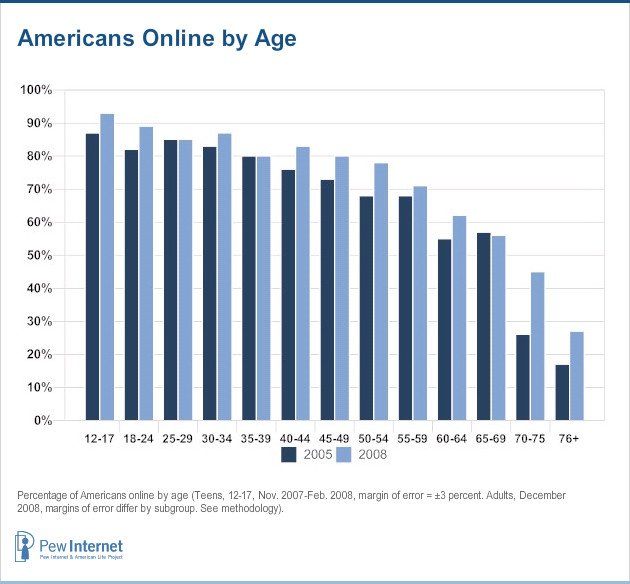Internet use reduces depression in the elderly by 20%. Whew. I've got to read those news alerts more carefully -- looks like I missed quite a bit of press about the October 15 announcement of a Phoenix Center Policy Paper of data analysis and conclusion by George Ford and Sherry Ford. The news articles about the study are quite confusing -- mixing up terminology (elderly? seniors?) so let's look more closely at the process that produced the conclusion.
- The study. The study itself addressed a sample size of 7372 non-working American adults age 55 or older from the longitudinal Health and Retirement Study conducted at the University of Michigan, derived into data maintained by the RAND Center for the Study of Aging (data from 2006).
- The data set. The HRS data is survey data for studying retirement and health, is done every two years, and surveys 22,000+ people over the age of 50. The Phoenix Center paper narrowed the data set down to 7372, including only respondents 55 or older, those who directly reported answers to questions, those who were retired -- that is, not working -- and those not in nursing homes. The depression index used was an eight-item scale derivation of the depression measurement developed by the Center for Epidemiologic Studies, known as the CES-D scale.
- The finding. From analyzing the data using multiple statistical methods, the researchers found that Internet use reduces the probability of a depression classification as determined by the CES-D scale. By using multiple approaches to analyze the data, the resulting reduction in probability of a depression categorization for these 'elderly' persons is about 20%. The authors noted that depression costs the US economy $100 billion annually, though 62% of those costs are employment related. But they suggest that with a 20% reduction in depression, that would account for $2 billion of health cost savings among the target population. The study cited Internet use from Pew Research that only 42% of those 65 and older are online.
- What it means. I have never forgotten the Mark Twain quote -- "there are three kinds of lies: lies, damn lies, and statistics." The cited research about online use percentages doesn't align with the Phoenix study age range. According to Pew Internet research, as of September, 2009, 77% of the 50-64 age group and 43% of those 65 and older indicate use of the Internet ('do you use the Internet, at least occasionally' and 'do you send or receive e-mail, at least occasionally'.) It is intriguing that high speed Internet access has already improved among 65+ users: broadband access in the home jumped from 19% in 2008 to 30% in 2009.
Promote access to the Internet among all older adults. We know that the Internet can provide everyone with access to information they need and connection to others that would keep their minds sharp and their lives engaged with others. The stimulus package (ARRA 2009) mentioned intent of the funds to 'organizations that facilitate' increasing broadband access to multiple populations, including the 'aged'. But I don't think we should be investing too much attention to the younger end of the study's population (that is the 55-64 age range) who are already mostly online.
Remember the required associated support. A big, big issue is buried in these numbers. We must make sure that we accompany investment in broadband with support, especially for older adults who are the least connected. Guarantee that any broadband expansion for this population has the right level of access services, training, software, and personal support services. At the higher age ranges, offer a reason to give it a try beyond potential reduction of depression -- which is an outcome, not a destination. I am not sure that benefit would be obvious to seniors considering whether to go online.
The next study -- a few requests. a) Limit the study population to age 65+, b) Do not exclude those who are working, since they seem to be healthier overall, c) Do detailed analysis of the attributes of age 75+. As part of promoting broadband access, we should understand more about the population that is NOT online today.



Comments
I am so tired of research on
I am so tired of research on "older adults" being done on 50 and over... 50!!?? Get real people--I work at a CCRC and average age is 80+. Let's see some studies out there that focus on the true "older adult", those 70 and older.
75+ statistics
These statistics are encouraging for boomer+ adoption. I agree with Courtenay and have seen experience that internet (especially broadband) adoption tapers exponentially after around 75 years of age. I would also love to see the statistics for this category.
Blog post updated with Pew Internet Use by Age (2008)
Age 76+ is approaching 30%. I would not be surprised to see it cross that in 2009.